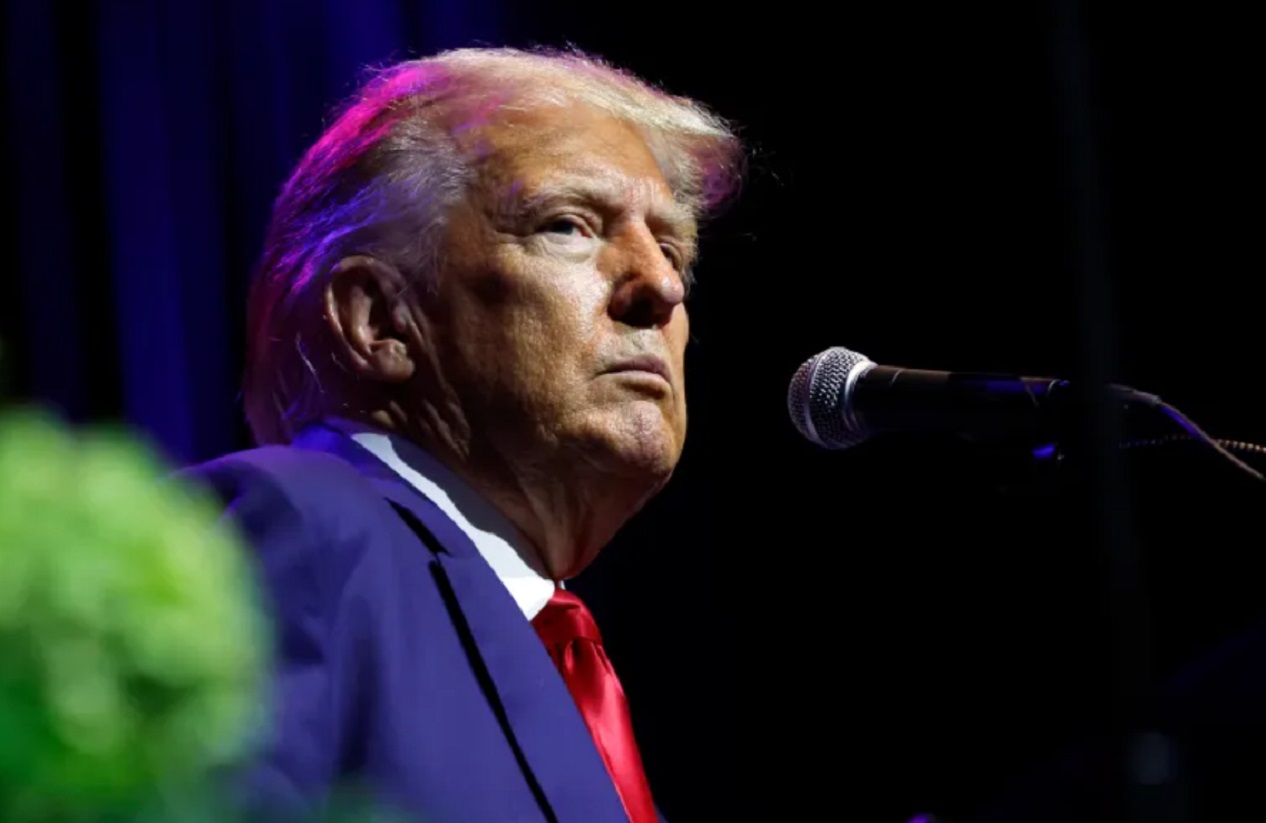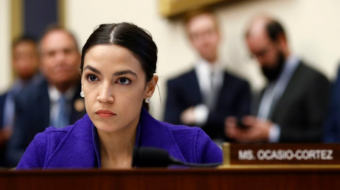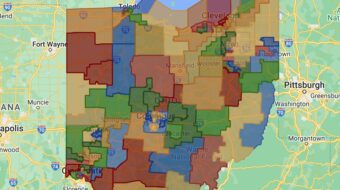
WASHINGTON—An Atlanta grand jury’s indictment of former Oval Office occupant Donald Trump and 18 co-conspirators is the most wide-ranging of all the cases against the former White House denizen, a panel of progressive leaders, including a legal expert, say.
That’s because the indictment, unveiled by Fulton County, Ga., District Attorney Fani Willis, whose office will prosecute the case, goes to the heart of what Trump and “his gang,” as one speaker said, schemed to do: Conspire, as racketeers, to overthrow the Constitution of the United States.
And, the panel emphasized, the indictments and looming trial will hold Trump and his co-conspirators accountable for what they did to the Constitution and the country.
“They’re antagonists of justice,” Christian Nunez, CEO of the National Organization for Women, said of Trump and his subordinates.
“This case is as large and as comprehensive as the attempted [Trumpite] coup was” at the U.S. Capitol on Jan. 6, 2021, said Brookings Institution legal and constitutional scholar Norm Eisen. “I think the proof is beyond ‘beyond a reasonable doubt.’”
The group offered its analysis in a press conference here on August 15, the day after Willis unveiled the 41 charges, led by racketeering, but also including conspiracy, false statements, impersonating a political officer, filing false documents and perjury.
Also charged with racketeering were Mark Meadows, who was Trump’s last chief of staff, Trump elections consigliere Rudy Giuliani, two other Trump attorneys, law professor John Eastman—concocter of the “fake electors” part of the scheme—and others in the wide-ranging conspiracy.
By contrast, the two indictments of Trump by Justice Department Special Counsel Jack Smith focused on him and were narrowly drawn, the panel, assembled by Public Citizen, said.
And only one indictment in D.C. focused on Trump’s attempted coup d’etat on Jan. 6, 2021, and the ensuing Trumpite invasion and insurrection at the U.S. Capitol that day to stop the constitutionally mandated electoral vote count. The charges in that indictment were narrower and technical, with little about the coup itself.
Part of a vast conspiracy
“What happened in Georgia is part of an overall scheme” by the radical right “and culmination of a decade-long effort to undermine our democracy. And it continues now,” warned Public Citizen President Robert Weissman.
“We know the threats to democracy epitomized not just on Jan. 6, but in the whole stream of activities in Georgia and around the nation, continue now with efforts to suppress votes, to sabotage elections, and to thwart the will of the American people.”
Willis hit those issues head-on, the panel said, by indicting Trump and his co-conspirators for trying to steal Georgia’s 16 electoral votes. Georgia was one swing state where Trump tried to heist wins via fake electoral ballots meant for Congress. Others were Michigan, Wisconsin, Arizona, Pennsylvania and Nevada. He also planned to try in New Mexico, which was not a swing state. It went solidly for Democratic nominee Joe Biden.
The criminal enterprise’s “purpose was to allow Donald J. Trump to illegally seize the presidential term of office beginning Jan. 20th, 2021,” Willis said on August 14. “Specifically, the participants took various actions to block the counting of the votes of the winners of Georgia’s 2020 presidential election.”
Trump tried to block the entire count of all the electoral votes—in swing states and elsewhere–and that’s what makes the Georgia indictment so wide-ranging and more important, the panel said.
He did so, added Brookings scholar Eisen, the practicing constitutional law attorney, by the racketeering conspiracy, which had four aspects and which extended far beyond Georgia, to try to deprive the entire nation of a legitimately elected president, Joe Biden.
Those basic aspects of the racketeering charge included pressure on federal and state officials to rig vote counts for Trump, up to and including Trump’s demand to Georgia Secretary of State Brad Raffensperger to “find” 11,780 popular votes to let Trump carry the state, by one ballot.
Raffensperger, a conservative Republican, had something to say about that, too, in a tweet when GOP elected officials, led by House Speaker Kevin McCarthy, R-Calif., leaped to Trump’s defense after the indictment.
“The most basic principles of a strong democracy are accountability and respect for the Constitution and rule of law,” Raffensperger retorted. “You either have it, or you don’t.” Gov. Brian Kemp, R-Ga., in another tweet, backed him up.
“The 2020 election in Georgia was not stolen,” Kemp tweeted. “For nearly three years now, anyone with evidence of fraud has failed to come forward–under oath–and prove anything in a court of law.
“Our elections in Georgia are secure, accessible, and fair and will continue to be as long as I am governor. The future of our country is at stake in 2024 and that must be our focus.”
Raffensperger and Kemp testified behind closed doors to the grand jury which later handed down the indictments and gave them to Willis. Both are among the few Republicans who obviously break with the Trump line. Others include Trump’s former Vice President, Mike Pence, and former Govs. Asa Hutchinson of Arkansas and Chris Christie of New Jersey. Almost all other GOP elected officials are in the cult of Trump.
Obstructing justice and perjury
Brookings scholar Eisen said other nationally important aspects of the racketeering charge against Trump and his team included “obstructing justice through perjury and false statements,” enlisting the fake electors, and creating their fake pro-Trump electoral vote certificates. “That’s like counterfeit money,” Eisen said.
Timing of the trial will be important, too, said Christina Harvey, executive director of Stand Up America.
“Now that we’ve gotten this far, it’s vital that this case be tried before the 2024 election–not just because Donald Trump may be on the ballot, but because it’s critical in a democracy to make it 100% crystal clear to election officials, candidates, party officials, and campaign staffers that attempting to steal an election is illegal and punishable by time in prison. We can’t have a repeat of 2020. Justice delayed is justice denied.”
Several panelists noted Trump and his co-conspirators singled out depriving Black voters in particular of their rights. Given his hate, they said it was no coincidence. In his own rants about “stop the steal,” Trump targeted what he called “fraud” in majority-Black Atlanta, Philadelphia and Detroit. There was none.
“It’s Black votes that caused” Trump to lose the election “and lose his mind,” said Cliff Albright, head of Black Voters Matter.
There’s another difference in this indictment, Albright pointed out. Most “solutions” for right-wing “oppression here in Georgia” and elsewhere are measures that are “going forward. They don’t go back and hold people accountable” for past oppression. The indictment does.
And when Republicans reply “nobody got hurt by Trump’s actions in Georgia” because he lost, the panel pointed out that’s not true either.
Atlanta popular vote counter Ruby Freeman, an elections board worker, and her mother, Wandrea “Shaye” Moss, had to leave their homes and go into hiding due to Trumpite threats of violence. Both are Black women. The indictment cited their trauma, too.
Fani Willis is using the state’s version of the Racketeer Influenced and Corrupt Organizations Act, known as RICO, to go after Trump and 18 allies she indicted Monday for what was their participation in a wide-ranging conspiracy to overthrow the U.S. constitution.
She said the conspiracy stretches far beyond Fulton County and into other swing states around the country. Her investigation also extended into rural Georgia, including Coffee County, where Trump operatives grabbed voting machines as part of their efforts to show that the election had been rigged.
Trump is testing the court in both Washington and Georgia by tainting and deriding the judges, the prosecutors and the entire process of his indictments. Judge Tanya Chutkan in Washington had admonished Trump against violating the conditions of his probation and by warning him to cease his inflammatory statements which harass both witnesses and jurors.
Trump immediately tested the judge by posting a string of additional inflammatory statements on the Internet.
We hope you appreciated this article. At People’s World, we believe news and information should be free and accessible to all, but we need your help. Our journalism is free of corporate influence and paywalls because we are totally reader-supported. Only you, our readers and supporters, make this possible. If you enjoy reading People’s World and the stories we bring you, please support our work by donating or becoming a monthly sustainer today. Thank you!













Comments